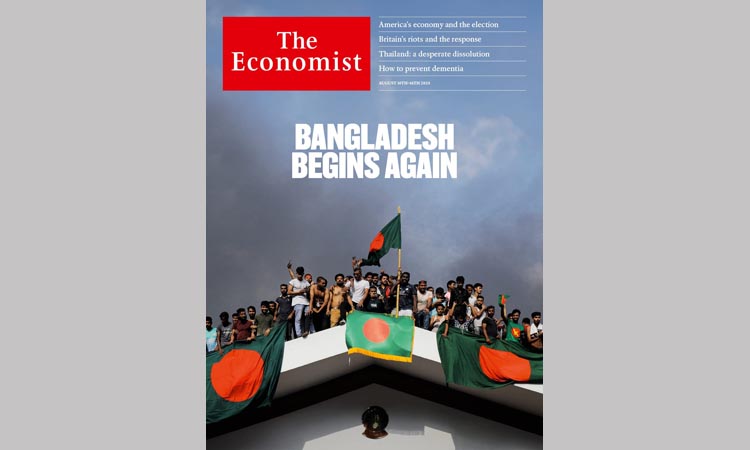Bangladesh begins again: The Economist


DHAKA, Sept 6, 2024 (BSS) – The Economist in its current issue ran the cover
page on “Bangladesh begins again” saying despite its daunting problems,
Bangladesh has advantages and in Mr. Yunus it now has a leader with moral
authority.
“Bangladesh matters; it must not be allowed to fail,” the internationally
famous weekly said, adding, “The good news is that the economy is resilient
and civil society is robust.”
The article said after Sheikh Hasina was driven out by a vast display of
people power on the streets of Dhaka, the capital, Bangladesh is replaced by
a caretaker government, backed by the army and led by Muhammad Yunus, a Nobel
peace laureate. Like him, many Bangladeshis are calling it a “second
liberation”, half a century after independence.’
The magazine writes: “Yet to meet the promise of the moment, Bangladesh must
do more than oust an ageing autocrat: it must also clean up a rotten
political system. The problems are venal political dynasties and the
enfeebled institutions that have failed to stand up to them. …Sclerosis at
the top has poisoned politics.”
Mr Yunus should aim to hold proper elections on a reasonable timescale, but
first he will have to clean up institutions that Sheikh Hasina captured, such
as the electoral authority and the courts, suggest the article.
Noting that Mr Yunus has a short time to set the country on a democratic
path, the article cited his success or failure will shape the lives of 173m
Bangladeshis, and influence the rivalry between China, India, Russia and the
West.
“Mr Yunus faces an immensely difficult task. His priority should be to
restore order and prevent waves of retributive violence, which have blighted
Bangladeshi politics in the past. This means ensuring that the caretaker
government, while run by technocrats, also includes representatives of the
protesting students and of all political parties, including the AL,” the
article added.
Suggesting to Mr Yunus to work fast, it wrote the unelected caretaker
government must not remain in office for too long lest it lose legitimacy or,
worse; its military backers are tempted to cling to power indefinitely.
The magazine, however, cautioned that the country could fall prey to Islamist
extremism, as Pakistan has. If the financial squeeze worsens, Bangladesh
could become dependent on China for cheap loans and arms. That would
destabilize relations with neighboring India and could erode democracy even
further.
“When it comes to the economy, the government should raise more external
funding to lower the risk of a balance-of-payments panic, and press for a
crucial new trade deal with the European Union. Most important, Mr. Yunus
must urge the political system to open itself to new ideas and leaders,
reflecting the aspirations of the country’s young, growing and increasingly
urban population,” the article said.
The magazine, however, blames India for backing strongman rule in Bangladesh
but stresses that it needs to do its bit: if it wants a stable neighborhood
it should urge democratic renewal and offer financial support.

